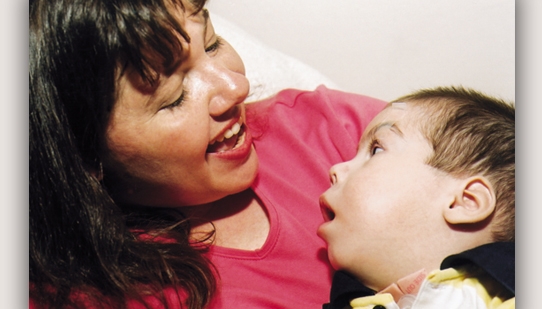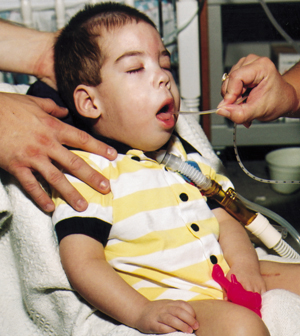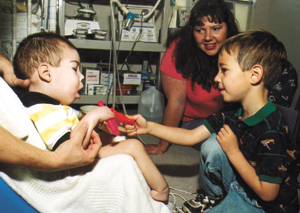
Coping with Neuromuscular Disease in Infants

Uncertain future, unexpected rewards
It's the kind of thing you think can never happen to you — until it does. Your baby is born with a life-threatening condition that fascinates but puzzles pediatric specialists, while it terrifies you and turns your family's life inside out.
Often such surprises come without warning. There's no family history of any such disorder, and prenatal tests have revealed no serious problems.
The first few weeks leave parents exhausted, uncertain whether their baby will live, and praying they'll make the right choices.
If the baby survives the first few weeks, a whole new set of questions arises: How will we afford to care for this baby? What will our insurance cover? How can we manage all this complex equipment?
And then there are the long-term questions: If the child survives, what will life be like? Will he walk? Talk? Play? Read?
There are often unresolved diagnostic issues, since muscle biopsies and other tests can be hard to interpret in infants.
Yet, with it all, there can be unexpected rewards in caring for critically ill babies. And some children go on to survive and thrive despite dire predictions.
'Every test you can imagine'
Albert and Monette Smith of Round Rock, Texas, knew all wasn't well with their second child even before he was born. Two sonograms had revealed that the baby's feet were fixed in an abnormal position and that fetal movements were less frequent than normal.
But they weren't prepared for the days that would follow Christian's birth on Nov. 6, 1999. He was born floppy, unresponsive and with very weak breathing. Doctors told the Smiths their son might be severely mentally retarded as well as physically impaired, but Monette didn't believe it. Christian, she says, "seemed to know who his mother was, that I was there," even in the first days of his fragile life.
During Christian's first weeks in the neonatal intensive care unit at a hospital in Austin, Texas, the tiny baby was subjected to "every single test you can imagine," Monette recalls. Doctors ordered brain and spinal MRI scans, metabolic workups, urine and stool examinations, a search for botulism. Nothing was conclusive.
Finally, with a confusing muscle biopsy picture, specialists concluded that Christian had type 1 spinal muscular atrophy, even though a DNA test for that disease had been negative. In SMA, muscle-controlling nerve cells in the spinal cord fail to function, leading to profound weakness of the muscles, including those controlling breathing. Children with type 1 SMA usually die before age 2.
'Calgon, take me away'
Christian's disorder, whatever it was, affected his muscle tone, breathing and swallowing. His stomach couldn't keep liquids from coming back up through his esophagus and potentially into his lungs, a condition known as gastro-esophageal reflux.
To protect the baby's airway, doctors performed surgery to wrap the upper part of his stomach around the lower part of his esophagus (fundoplication). They also created a sealable opening into Christian's stomach through which formula could be given via a gastrostomy tube. Delivering food into his stomach bypasses the weak upper airway muscles that could allow food or liquids to get into the lungs and cause infection or choking.
The Smiths were in shock. "When you have a child, you're worried about getting up at night, about diapers and formula," Monette says. "You're not thinking about life and death decisions. Your whole world has just crashed around you. You feel so out of place. It was like, 'Calgon, take me away.' How did I get here? I don't want to be here."
But there was no escaping the truth. Christian might not survive in the long term, and in the short term, his care would take an almost unthinkable amount of time, effort and money.
Rooming in, freaking out

Some weeks after Christian's birth, Monette and Albert took advantage of the hospital's rooming-in plan. They stayed with Christian for a weekend while learning how to take care of him and manage all his special equipment, with professional staff nearby to help in an emergency.
At the end of the weekend, they were exhausted. Neither had gotten any sleep, with monitor alarms going off all night and Christian needing to have secretions suctioned out of his airway many times an hour.
It was becoming clear that one of them, probably Monette, would have to stop working and take care of Christian 24 hours a day (along with their older child, Corbin, then 2). At the time, Monette was making $30,000 a year as an accountant, and Albert was making $34,000 in the information technology department of a large computer manufacturer.
With the loss of Monette's income, the family would probably have to sell their home and cars to pay the medical bills. Nursing care, even just for a night shift, would cost some $64,000 a year. But, without it, how could Monette stay up all night and take care of Christian during the day?
The Smiths learned that 24-hour nursing care for Christian, for which their insurance companies denied coverage, would cost $192,720 a year — hardly affordable. Yet, with nursing care, they believed they could keep their jobs and somehow manage to pay for everything else on their list, which grew longer every day.
The list was full of unpleasant surprises. They'd have to pay for the formula Christian takes in through his tube. It cost $38 a case and the baby went through about a case every week and a half. Christian's equipment needs included an oximeter, a device that measures oxygen through the skin using a probe that clips to a finger or toe.
The Smiths' insurance would cover one probe a month. But a probe doesn't last a month, and the Smiths have to replace them at $120 each.
Disposable medical supplies such as sterile gloves, tape, syringes, gauze pads, hydrogen peroxide, saline, cotton balls, sterile water, etc., aren't covered by insurance.
"Then there are the nonmedical items you need," Monette says. "For example, lots and lots of receiving blankets when you have a child who can't swallow, pillows of various shapes and sizes for support, a backup power source in case the electricity goes off and the local electric company is slow to respond, and membership in a local pool or recreation center for aquatic therapies."
'Too damn tired'
Hospital staff members offered the Smiths unrealistic advice, urging them to ask family members — who lived far away and had their own jobs and families — or nonexistent neighbors to help.
Nurses told Monette, "I've seen parents become advocates for their children." Monette responded bitterly, "I'm too damn tired to be an advocate. I'm waking up every day to the possibility of a funeral. I want a normal, healthy child. I have no background with this, no children with this. I'm not a nurse. I know nothing except changing diapers and giving bottles."
Although Monette didn't know whom to call, what agencies to contact, or how to get the desperately needed 24-hour nursing care, she had to start somewhere. If she and Albert couldn't both keep their jobs, she saw bankruptcy and destitution in the future.
She began with a legal pad, the Internet and a phone book. "I charted everything," she says. The hospital charts, which were used as records for the insurance companies, were constructed with one-hour blocks that nurses would sign to show that they had been responsible for suctioning Christian's respiratory secretions and otherwise tending to him during the hour. Monette's chart showed more detail — for example, that Christian was actually suctioned several times an hour.
The determined mother contacted the Texas Department of Insurance to appeal her company's decision. She e-mailed then-Gov. George W. Bush and her state legislators.
"I said to these people, 'You're wanting to take two honest, hard-working individuals who are going to have to quit their jobs and go on welfare to get Medicaid. If the insurance will pay for nursing care, we can pay for the rest of the bills. Otherwise, you're going to end up supporting a family of four.' I knew that the best way to help Christian was to help ourselves a little bit."
Soon, a legislator called and asked Monette for the names and numbers at her insurance company. Shortly thereafter, the company's offer suddenly changed from providing nursing care for eight hours a day for one week to 24-hour-a-day coverage for an indefinite period.
Hard decisions
Although the Smiths were able to resume some semblance of a normal life, their troubles were far from over.
Christian began having trouble with his feedings at about 8 months. Liquid would come back up from his stomach into his esophagus no matter what his parents did to prevent this. At the same time, his breathing was weakening, and his heart, having to do extra work to support his breathing, was dangerously enlarging.
On Sept. 18, at 10 months old, his right lung collapsed, and he nearly died. Christian survived but his condition remained weak, and doctors advised the family to take a hard look at the future and what measures they would or wouldn't take to keep their baby alive through the next crisis.
"It's easy for them to say you should let the child go," Monette says. "It's different when it's your child. It's not easy to watch a kid gasp for breath. Christian was still very social, he was starting to babble, and he was moving his limbs. As long as he was willing to fight, we were willing to help him out a bit."
Christian started on BiPAP (air given through the nose or mouth) during the night. He also stayed on continuous oxygen therapy. The Smiths decided they didn't want their baby to have a tracheostomy (opening in the neck) for ventilation, and that they wouldn't have Christian resuscitated if he had another respiratory crisis. But that decision was soon put to the test.
'This is not SMA'
Suspicious of the SMA diagnosis, the Smiths had continued to do research and to compare their son's symptoms and appearance with that of other children with SMA. Their search landed them in December 2000 in the office of Susan Iannaccone, a pediatrician at Texas Scottish Rite Hospital for Children in Dallas, where she co-directs the MDA clinic.
After examining him, Monette recalls, the doctor put her hand on Christian's leg, looked at his parents and said simply, "This is not SMA."
Monette and Albert were again in shock, but this time there was optimism underlying their anxiety. Plans were made for a new muscle biopsy, after routine respiratory tests.
The tests showed that Christian's carbon dioxide levels were much too high, a sign that his respiratory function was dangerously out of whack. Again, the child went into respiratory crisis, and was transferred to Children's Medical Center of Dallas, where his parents were told they had to make a decision. Should the doctors put a tube down Christian's trachea immediately and start him on a ventilator? If they didn't, he would die.
"I have to thank that doctor," Monette says of the emergency room physician who talked to them that day. The doctor said, "I can tell you that you've been living with this incorrect diagnosis this whole year. Part of the problem here has been caused by the oxygen he's been on. You don't know what the possibilities are for him, and he deserves this chance."
Shaken, the Smiths agreed to have Christian intubated and ventilated. His carbon dioxide quickly returned to normal, and, with his condition stable, the muscle biopsy was performed — on Dec. 7, a year to the day after his first biopsy in Austin.
The next evening, Iannaccone telephoned the Smiths and told them the news. Christian had nemaline myopathy, a muscle disorder with a prognosis at least potentially better than that with type 1 SMA. The doctor had seen few cases of this rare disorder but remembered one child in particular, whom she had treated when at Boston Children's Hospital. Tentatively, Albert Smith asked what had become of that child. "She's 14 years old and goes to school," Iannaccone replied.
"We just celebrated and thought that was the most wonderful thing we had ever heard," says Monette. A week later, Christian underwent surgery.
"We had never wanted to do the trach when we thought it was SMA," Monette says. "But I went on the Internet and saw children who had trachs and vents who were sitting up, playing with siblings. Everybody was so upset that he was in the hospital at Christmastime, but we weren't. We felt like it was our Christmas present. We were so excited that Christian had hope, something we had never had before with him. We had something to look forward to now."

Through his state's early intervention program, Christian, now 19 months old, is getting physical, occupational and speech therapies with oral stimulation to prepare him for normal eating.
He can make noises around his trach, tries to sing with music and has gained in strength. The Smiths are considering doing surgery on Christian's feet so he can walk if he gains enough strength for that.
Christian can now lift his head, almost roll over and work more with his hands. He's holding his eyes open for longer periods, and his chest cavity has opened up and widened out. His shoulders are in better alignment, and he can twist his torso.
Says Monette, "My kid is alive. My child has taught me more in his short lifetime than I have learned in all of mine. I've never been patient, and now I am. I used to be very perfectionistic.
"When you have a special needs child, your schedule is not your schedule anymore. You learn to let the small stuff go. Christian has so much strength that it gives you strength. You look at everything he has overcome."
The beauty of Holland
Monette is fond of a poem that compares having a special needs child with going to Holland when you expected to go to Italy.
In the poem, she says, "You go to a travel agent and you're all ready to go on a trip to Italy. You have the brochures, you learn Italian, you've booked a hotel. But you walk off the plane and you're in Holland. You don't speak the language, you don't know where to go or what to do. But over time, you find that Holland is just as beautiful as Italy."
What now?
At first, many parents feel overwhelmed with the technical, as well as the emotional, challenges that come with a high-risk newborn.
Parents in this story advise: First, make sure you get all the education you need to work with special equipment. This learning should take place before you take the child home from the hospital. Don't leave without it, and make sure you have 24-hour phone numbers for all the relevant equipment companies.
Then comes "real life": setting up routines, perhaps returning to work and caring for other children. You may feel alone with your problems, but don't be afraid to make contact with people and agencies who can help. Also keep in mind the words of Benjamin Spock, America's legendary pediatrician: "Trust yourself. You know more than you think you do."
Hospital Social Workers
Almost all neonatal intensive care units have medical social workers who know the local, state and federal resources and regulations. These specialists can often intercede in difficult matters with insurance companies or other agencies, and sometimes even with relatives! You can see the hospital's medical social worker even if you've already gone home.
Early Intervention Programs
The Individuals With Disabilities Education Act (IDEA), among its many other provisions, requires all states to set up early intervention programs to help children between birth and 3 years to achieve their maximum potential. Look in your local telephone directory in the state government pages, under health, education or children's services.
National Information Center for Children and Youth with Disabilities provides resources by state: (800) 695-0285.
Travel Related to Medical Care
Traveling to another city for medical care isn't uncommon with a seriously ill child. Needless to say, it can get very expensive. One source of assistance with travel and accommodations is the Ronald McDonald House Charities, (630) 623-7048, rmhc.com
Hospice Care
Hospice care means keeping someone who has a terminal illness comfortable, regardless of age. The emphasis is on care, not cure, and care can be delivered either in or out of your home. Social workers, your local Yellow Pages and the Internet can help you locate resources in your area. Or try Children's Hospice International at (703) 684-0330 or chionline.org.
Fixing Insurance Troubles
If you need to appeal a decision by your insurance company, you can do so through your state's Department of Insurance. State legislators, even the governor, may also respond to inquiries about trouble with an insurance company or government-based financial help.
Help with many questions about care for your high-risk infant is available from your MDA health care services coordinator or your MDA clinic physician. Also check with your pediatrician or pediatric nurse practitioner, licensed pharmacists, and local librarian. The latter can help you find information on just about anything.
MDA Resource Center: We’re Here For You
Our trained specialists are here to provide one-on-one support for every part of your journey. Send a message below or call us at 1-833-ASK-MDA1 (1-833-275-6321). If you live outside the U.S., we may be able to connect you to muscular dystrophy groups in your area, but MDA programs are only available in the U.S.
Request Information